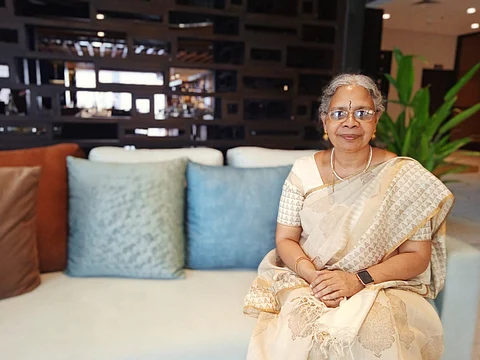

The unbearable heat of Palakkad appears to have played a role in Annapurni Subramaniam becoming an astrophysicist. As a girl, she would wake up at odd hours to beat the Palakkad heat, and during those hours she'd look up at the night sky and gaze curiously at the stars. There was no one around whom she could ask more about the stars or the constellations. Years later, when she compulsively studied them, she was gently prodded to try day time astronomy so she wouldn't have to work at night. But Annapurni stuck by her stars, took her PhD in Physics - Astronomy, did her post doctoral research, and became the first woman to head the Indian Institute of Astrophysics in Bengaluru.
She shared her story at the Global Kerala Science Festival in Thiruvananthapuram on Sunday, January 28, for a session intended “to inspire more women to take up science”.
When she had no one to ask about stars, Annapurni told TNM in a later interview, she used to go to the library and beg to take cutouts of the constellations from The Hindu newspaper. “I would then sit in the night with the newspaper cutting and try to identify the constellations,” she says.
Her parents are both Carnatic musicians and Annapurni plays the violin, mostly as an accompanying artist to her father. “There were times when I thought of making a career out of music, but I’d always come back [to Science]. After my Masters in Science, when I used to wonder what I would do next, I could get a teaching job but that was not very motivating. It was after that I decided to undertake a PhD,” she says.
Annapurni studied star clusters and the magellanic clouds (two galaxies orbiting the Milky Way) at the Indian Institute of Astrophysics. Later, she worked on a space programme called Astrosat and was a calibration scientist on a UV Imaging Telescope. Her experience in leadership came with Thirty Meter Telescope (TMT) projects.
Women in Science
"I didn't have any role models when I began my journey. I pursued astronomy because I wanted to,” she says, when asked about the changing work conditions for women in science. “Women astronomers were there all along in our institute. When there is support you can work well. Otherwise you have to take a backseat and look after the family. Nearly always, the responsibility of taking care of kids falls on the women. They take leave and stay home and come back and do the work. In the early days they couldn’t take work home. So even the really smart women astronomers could not rapidly climb up the ladder,” Annapurni says.
It helped Annapurni that her parents were ready to look after her children since both she and her husband are working professionals. She also made sure that her children were sensitised early enough about how passionate she was about her work. “I help you, you help me, I told them. I don’t make everyone's breakfast, everyone is empowered to make their own. These are life skills, not a burden,” she adds.
A lot has changed in the last couple of decades, with technology and internet connectivity allowing women to take work home. But it comes with another problem — you will always be working, she says.
Leadership
As a leader heading a prestigious institute, her discomfort has often stemmed from being the only woman in the room during a meeting or a discussion. “Slowly, we are also seeing more women rise to leadership positions. It's like a pyramid where at every stage you need people to push you up to reach the top. Women should be there in committees and boards where you can promote more women to be there in the workforce. In the last decade or so, there has been more awareness about inclusivity,” Annapurni says.
Watch: Annapurni on the launch of XPoSat mission
Even now in conferences, the practice is for women to talk with other women and the men to gather with each other, she says. So when Annapurni becomes the only woman in a room, she is often left with no one to talk to. Socialising is important, she says, because some things get done when you talk outside the boardroom.
But she does not let herself be not taken seriously. “I have learnt to make my own space and you need to have a double dose of confidence that you can do it. If someone is not giving you space, it doesn’t mean there isn't space, I should know how to create space. If you make a statement that you can do better than anybody else, then everybody will listen to you. But you have to work hard. It is not going to come by easily,” Annapurni says.